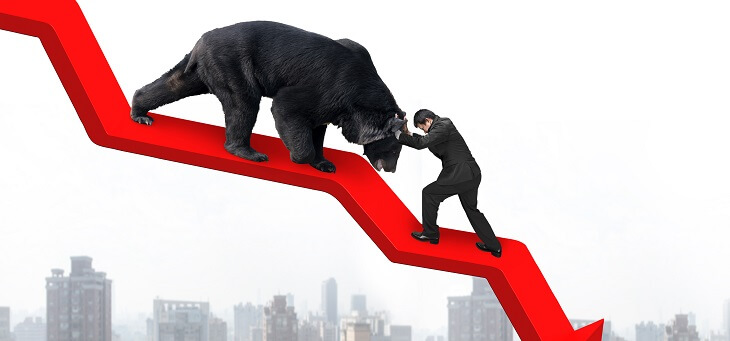Every economic indicator, almost every financial commentator, government figures and probably your neighbour down the road, are predicting a sustained world-wide recession.
War, the pandemic, rising cost of living, inflation, interest rates all combined to tip the balance over to what financial institutions call a bear market.
A sustained falling market is called a ‘bear’ as opposed to a ‘bull’ market where prices are rising or expected to rise.
Commsec said both the All Ordinaries and the benchmark ASX lost considerable ground over the 2021-22 financial year and in the US stock investors suffered their worst start to the year since 1970 with the S&P indicator falling 22 per cent until June 30.
Read: How the Big Four get away with offering ‘paltry’ term deposit rates
What does this mean for share investors?
Investing in a bear market sounds like backing a lame horse, but it’s possible to change tack and shore up your portfolio to bounce back even stronger.
A falling market can just be a sign of the market adjusting to real-life circumstances. Companies that expanded too quickly or into the wrong market will be brought back into line in a bear market, making the economy even more efficient when the economy inevitably gets back on track.
Read: Simple ways to protect yourself when doing your day-to-day banking
So how can you get the best out of your share portfolio, or what are some investment strategies for a bear market?
A falling market isn’t all bad, but it does require a different strategy.
First of all, you should take the long-term view and resist the temptation to sell in a falling market.
Conservative investors should always consider shares a long-term investment, weathering the highs and lows to eventually deliver a decent nest egg, very much like your superannuation.
If you want a return from an investment under five, or even 10 years, the share market probably isn’t for you.
A bear market is a chance to retune your portfolio to concentrate on quality investments that have steady, reliable dividends and growth but it’s also your chance to pick up a bargain as well.
Read: Inflation hasn’t been higher for 32 years. What now?
If you have been following a company, but felt the share price was overheated, a bear market is your opportunity to jump on board for an investment that could set up a financial foundation for your retirement.
You should also consider a dollar-cost averaging plan, which is the practice of continually investing money over time and in roughly equal amounts. It’s a strategy to reduce the impact of price volatility by spreading out stock or fund purchases over time.
A bear market is also a good opportunity to diversify your portfolio. If you have traditionally only invested in a certain type of share, now is your time to pick a different industry to solidify your returns. As one group of shares falls, usually another rises.
And it’s not just different shares, what about bonds or unit trusts? Both represent steady income streams.
It’s also a good time to consider what performs well in recessions. People still have to eat and heat or cool their houses. It could be a good opportunity to invest in utilities or consumer staples.
What’s your investment strategy in a recession? We’d love to hear your tips in the comments section below.
If you enjoy our content, don’t keep it to yourself. Share our free eNews with your friends and encourage them to sign up.
Disclaimer: All content on YourLifeChoices website is of a general nature and has been prepared without taking into account your objectives, financial situation or needs. It has been prepared with due care but no guarantees are provided for the ongoing accuracy or relevance. Before making a decision based on this information, you should consider its appropriateness in regard to your own circumstances. You should seek professional advice from a financial planner, lawyer or tax agent in relation to any aspects that affect your financial and legal circumstances.

